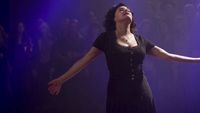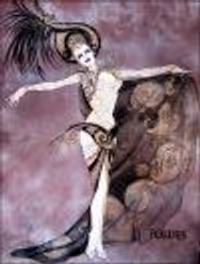What did you think of Sunset Boulevard (1994)?
#50What did you think of Sunset Boulevard (1994)?
Posted: 6/14/12 at 9:49pm
I can't really say I disagree with the faults people point out abot this show (except for the sets which I thought were perfect). But in spite of all of that I still loved it. And I loved Glenn Close's unhinged performance.
I've always hoped they would make a movie of this. Directed by David Lynch and starring Liza Minnelli.
Updated On: 6/14/12 at 09:49 PM
#51What did you think of Sunset Boulevard (1994)?
Posted: 6/14/12 at 10:04pm
"Does anyone know whatever happened to the girl who wrote the original lyrics to Norma's two hit songs? IIRC, She was a college sophomore or something and Webber fired her with an agreement purchasing the rights to those two lyrics ("With One Look" and "As If We Never Said Good-bye") without giving her credit. "
That must be Amy Powers. I'm curious too--I didn't realize she was responsible for those two pieces (which makes me think she deserves more than the tiny footnote credit she got). I think the coffee table book that came out about the musical goes into more detail--I'll have to see if I can find my copy.
#52What did you think of Sunset Boulevard (1994)?
Posted: 6/14/12 at 10:47pmI'll never forget being 16 or so and taking the train to NYC (from NJ) with $50 in my pocket, thinking I would get me into Sunset Blvd. It was sold out, it was a Saturday night - with Glenn Close, and even back then, $50 was not going to cut it. I think back then top ticket prices were $76. I never saw this production, but the double CD with Patti Lupone is one of my guilty pleasures. "I love flannel on a man".
#53What did you think of Sunset Boulevard (1994)?
Posted: 6/15/12 at 12:50amI like the show and I agree with everyone who's said that Buckley was brilliant.
kipster
Understudy Joined: 1/8/11
#54What did you think of Sunset Boulevard (1994)?
Posted: 6/15/12 at 3:45amThe aforementioned Fulton theatre production is a coproduction with Maine State Music Theatre, where Karen Mason had been on board to play Norma, that is until Rebecca came around (and was originally supposed to have opened by now). Too bad because it would have been wonderful to see her in it, and now she's not doing much until Rebecca opens...
#55What did you think of Sunset Boulevard (1994)?
Posted: 6/15/12 at 5:42am
"To answer the question about the set floating - At certain points the entire mansion set lifted off the ground and action that took place in other locations was played out below it. I've always wondered how they actully managed that!"
I get some of the argument about it not adding anything dramatically, but it was definitely a coup de theatre which (I almost regret aditting) justified it for me in this case, especially since the mansion is so much a characterin the piece--the film as well.
When I saw Whistle Down the Wind in Gale Edwards production in London (a problematic show, though I enjoyed it much more than I expected, partly because the actual production was pretty great), they kinda used a small version of the SB design with the main set hydraulically raising and lowering for scenes played underneath, which really did work (and given the story with where The Man hides for much of the play, it did work dramatically). Of course the subsequent super cheap tour that also toured the US used a different design and direction (and apparently was pretty awful).
#56What did you think of Sunset Boulevard (1994)?
Posted: 6/15/12 at 11:49am
I love this thread- brings back so many Sunset Blvd. memories. Sunset was the first show besides Phantom and Les Miz which were the Wicked and Rent for my generation, that I really got into. I bought every CD, sometimes paying lots of money on ebay for those rare CD singles that were limited releases.
I think the controversy that helped Sunset become the darling of the free press while the whole Patti/Glenn/Faye thing was going on was also what eventually killed it. It has lots of spectacle with the mammoth set and costumes (which I still think are some of the most beautiful I have ever seen) but at the end of the day, once Glenn left the show and Patti moved on, must of the excitement died down.
Buckley got very good reviews and Paige was good- but a bit over the top in the acting department.
The show also came along at a time when shows were getting smaller in cast/set/score- the smaller more intimate musicals were about to start making a huge mark on the NY Theater scene- the very next year in fact gave birth to RENT. The age of the mega-musical was basically over before Sunset arrived and the show simply couldn't live up to its own hype and press.
I believe it is a very well written piece by Webber- I love Norma's big numbers and believe it to be one of his top three pieces overall.
The Patti/Glenn debate will rage on until the end of time- and hold onto your hats if it ever does make its way to the silver screen again- the "who should play Norma on screen debate" is almost as hotly contested!
The Scorpion
Leading Actor Joined: 1/3/07
#57What did you think of Sunset Boulevard (1994)?
Posted: 6/16/12 at 10:44am
I love this show. It's not ALW's absolute best (IMHO his best are Evita and Phantom), but it's certainly up there. Some moments of the score are gorgeous, although on the downside it is repetitive even for ALW's standards and was largely composed by stitching together songs from his trunk. Structure-wise it is pretty solid, thanks to being faithful for the most part to the Wilder film. And getting Christopher Hampton on board was a great decision as there is some wit in the libretto, which, though plagued with some not-so-great lyrics by Don Black, is certainly one of the better libretti an ALW piece has received. Had ALW stuck to being the composer only, as he was with Evita, it might have been slightly better...too much for his time was spent as the producer of a a chaotic enterprise that had no end of backstage problems, from diva hiring and firing to cooking the books. It was a PR-disaster and brought RUG to its knees financially. I also think the near-simultaneous closure of the worldwide cloned productions signalled the end of the British mega-musical.
I saw the London production at the Adelphi with Elaine Paige, who was formidable, and the actor/musician revival plus a beautiful, beautiful production that was a literal homage to the Billy Wilder film in Gothenburg last year. Scale-wise it was near the original and it was so nice to hear it played with the full orchestra again. See pics here: http://en.opera.se/press/bilder/sunset-boulevard-2010-2011/
The LuPone/Close debate has never ended, but, though I like LuPone, I think Close is virtually unsurpassable in her stint in the role, especially in LA. Say what you will about her voice (but it's absolutely not true she can't sing), her acting is absolute impeccable. She became Norma, whereas I feel Patti played, well, herself to some extent. I love how you can even 'hear' her acting on the American cast recording.
I think Sunset was the last great thing ALW ever did. It's been downhill ever since.
Updated On: 6/16/12 at 10:44 AM
AEA AGMA SM
Broadway Legend Joined: 8/13/09
#58What did you think of Sunset Boulevard (1994)?
Posted: 6/16/12 at 1:46pmIt's hard to hear Patti acting on the original recording because she goes from belting out the score to whispering the dialogue. I find it very hard to set a comfortable volume level when I listen to that recording.
#59What did you think of Sunset Boulevard (1994)?
Posted: 6/16/12 at 5:19pm
I think Eric hit the nail right on the head in saying that mansion is a character, of sorts. I think it's as much a character in Sunset as Norma, or Joe, or Betty is. It certainly added a great deal to the 2 performances I saw with Glen in L.A.
That's not to say that huge set is absolutely necessary for the show to work, but it is part of the reason THAT production worked so well. And no, I don't buy the argument that it worked well by concealing the show's flaws (or...distracting audiences long enough that they didn't notice). I'm not the type that sits there in a half coma, waiting to be *entertained*. Every flaw pointed out so far I noticed either while watching the show or the many times I've listening to it, but those flaws haven't taken away my ability to enjoy the piece as a whole. Not putting down those who found it lacking and mediocre as they have every right to feel differently and have explained why they feel the way they do. I just have a problem with the tired rationale of how the big set covered flaws and how some cheesy lyrics renders the whole thing a piece of crap.
Someone mentioned earlier that this show was criticized for its "literal" set design. Some of the sets were designed, I guess you could say, with a literal approach but not only is that approach valid for the stage, there was a perfectly logical purpose to doing this show that way, at least the landmark locales.
The Paramount gate; Schwabs; the Paramount sound stages, all of those are real life locales and part of the allure of including them in a production like Sunset Blvd., which also is a sort of homage to old Hollywood, is how well those are recreated. But that's just the historical settings.
I'd say Norma's mansion is the one piece that isn't done so literally. I love the obvious perspective tricks used as well as the overblown opulence, none of which are centered in reality. There is also a keen sense of loneliness that emanates from it. John Napier is a genius in the way he stirs just the right emotional response and infuses static elements with an essence that makes them feel alive. He did the same with Les Mis. He was less successful with Saigon but managed to create some visually haunting settings in that, too.
Then there's the manner in which his sets are incorporated and showcased in the story, which is as theatrical as one can get. The sets may have been more literal than most, but the delivery system was evocative in itself and served the storytelling effectively. In my memories of those two performances, I can't recall a single distracting scenic element. It all blended very well together and Sunset remains one of the most seamless productions I've ever seen.
#60What did you think of Sunset Boulevard (1994)?
Posted: 6/16/12 at 5:26pmMy Oh MY - love your analysis of the Sunset set, and John Napier in general. 100% on the money!
#61What did you think of Sunset Boulevard (1994)?
Posted: 6/16/12 at 9:02pm
My Oh My, I agree that the mansion is a major character in the story.
That is exactly why I resented seeing it diminished when it began to "float".
#62What did you think of Sunset Boulevard (1994)?
Posted: 6/16/12 at 9:07pmI'm not sure I get--or more likely remember--the comment about it floating. I sorta felt it always loomed as a presence in the back, even when other scenes were played out. (Again though, I suspect that's partially my "romantisization" of the production in my teenaged mind after seeing it).
#63What did you think of Sunset Boulevard (1994)?
Posted: 6/16/12 at 11:46pm
Or maybe I just babble too much. So much, I embed my thoughts in people's memories. I say that because what you wrote above is almost word-for-word what I've described as the effect Les Mis' static, but atmospheric, towering, and ominous set has on the show as it plays out. It almost appears to be watching!!
That last bit is definitely a romanticization on my part but that's not to say it exists only in my head as how I've described it are the best words I can think of that gel with the impression I've always gotten, even after seeing it for the first time. But, yes, highly subjective, nonetheless.
And sort of puzzling because in all my years as a devoted fan, it's the one design that is neglected and hardly ever spoken about. I don't get why as I think it's one of the single most beautiful, evocative sets I've ever seen. Typical Les Mis set discussion, even by HUGE fans that have seen it a billion times, consists of the revolve (which isn't really a set piece, btw) or the transformer barricade. John's abstract, crumbling city set that is so effective to me seems to never be noticed. The one review--a San Francisco review of the 3rd NT back in '92--that mentioned "the shuttered but warmly glowing windows" of Napier's set and how that was symbolizing the shunning of society by society itself, made me squee in delight as a young fellow. And people tend to want to take its staging so literally, even as it's obvious to even the blind, I'm sure, that it's anything but. Ah, well. I'm just one of those biased passionates, so I'm best ignored, eh? lol. XD
As for Sunset's mammoth "floating" casa, I've never used that term in describing it but it is accurate in that it does give that impression. To me, it's a set that "glides." Hehe.
Jay94
Featured Actor Joined: 4/10/11
#64What did you think of Sunset Boulevard (1994)?
Posted: 6/17/12 at 4:29amI don't know if you've listened to it lately but it is so incredibly repetitive even for ALW standards. Seriously, there are about 4 or 5 tunes that are just repeated throughout the musical.
JeanGudio
Stand-by Joined: 6/9/12
#65What did you think of Sunset Boulevard (1994)?
Posted: 6/17/12 at 5:33amI heard so much about Glenn Close I think she won her third tony bedumn was her 1st I think. She was quite amazing but did not see the whole show but did a youtube clip.
AddisonMizner
Broadway Star Joined: 10/7/11
#66What did you think of Sunset Boulevard (1994)?
Posted: 6/17/12 at 7:28am
I haven't seen a live production of "Sunset" but got the Glenn Close recording a few years ago because I heard some great things about it. I liked it, but did not LOVE it. Norma's two big songs "With One Look" and "As If We Never Said Goodbye" are beautiful and perhaps two of the best songs Lloyd Webber has written for any of his musicals, and I also like "Too Much In Love To Care but other than that, the piece doesn't really do anything for me, though the orchestrations (as with almost all Lloyd Webber shows) are gorgeous. I also get the impression from the recording that the show is in need of some serious editing. As has been spoken about before, the show should end with the famous "close up" line instead of Norma's small reprise of "With One Look" and I also think things like "The Lady's Paying" should be cut as it does not particularly serve any purpose and musically just sounds like a variation of themes that have gone before. Also, some of the lyrics need revision.
I wouldn't rank Sunset as one of Lloyd Webber's best scores. For me personally, that title goes to "Jesus Christ Superstar". I also disagree that Lloyd Webber's musicals went downhill from "Sunset". I actually really liked "The Woman in White". I think musically it is one of his most complex scores, in a lot of ways very Britten-esque and has some beautifully poetic lyrics that have not been seen in a show of his since "Phantom" (some of them are trite, such as "I Believe My Heart", but overall I believe they are very well written). I don't know what others think of this and whether anyone agrees with me? Also, for all its flaws (and there are many), I really like "Love Never Dies". It is one of my favourite Lloyd Webber shows if only for the beautiful score.
#67What did you think of Sunset Boulevard (1994)?
Posted: 6/17/12 at 6:23pm
I'm not sure I get--or more likely remember--the comment about it floating. I sorta felt it always loomed as a presence in the back, even when other scenes were played out. (Again though, I suspect that's partially my "romantisization" of the production in my teenaged mind after seeing it).
I wasn't the first to use the word "float". I picked it up from others earlier in this thread.
Basically, the apparently stone and marble house just rose into the air, first (I believe) revealing a garage underneath it (where Joe hides to avoid his creditors) and then later providing a space for other scenes, such as the drug store where Joe and Betty go to a party (IIRC).
IMO the "floating" house was a gimmick that added nothing to the narrative. It was simply an arbitrary coup de theatre invented because the story didn't call for a falling chandelier or a helicopter. But as I said above, it had the effect of reminding one that the great mansion (which is both a palace and a prison) wasn't really a mansion at all.
#68What did you think of Sunset Boulevard (1994)?
Posted: 6/17/12 at 7:46pm
A lavish show and, while right for the times, I don't think it would go over today.
I almost never listen to the Glenn Close recording, which I think is far inferior to the Patti LuPone/Kevin Anderson version. I only saw the show once, the Broadway production with Betty Buckley, who was superior to what I've seen of Close in clips.
#69What did you think of Sunset Boulevard (1994)?
Posted: 6/17/12 at 8:15pm
I saw it in L.A. before it went to Broadway.
I left the theatre humming the set.
blocked: logan2, Diamonds3, Hamilton22
#70What did you think of Sunset Boulevard (1994)?
Posted: 6/17/12 at 8:38pmGavestone, you don't feel that having such a huge set piece looming over the others was, at least somewhat, on purpose?
#71What did you think of Sunset Boulevard (1994)?
Posted: 6/17/12 at 10:36pm
Well, yes, clearly it was on purpose, but I take your point to be that there were meetings where the choice was justified dramatically and I'm sure you are right. I don't doubt the creators came up with thematic rationalizations for the set choice. I simply don't agree. I think they fooled themselves into thinking a mere gimmick was something more.
To have the mansion loom over the proceedings while other scenes take place in front of it is one thing. To have something which looks so heavy and solid suddenly "float" destroys the illusion. Even if the mansion had merely rolled upstage to make room for other scenes, I could have maintained the suspension of my disbelief. But lifting it ten feet in the air was something else entirely.
Whatever their rationale (and I can't remember whether the book on the show covers it), I really do think it was just a gimmick. But for me, it was akin to the moment in PHANTOM where the Phantom and Christine disappear into the floor only to reappear instantly on the highest catwalk. Very cinematic, Mr. Prince, but it also makes it obvious that one set of couples are played by doubles and suddenly I'm wondering whether anyone is even singing live.
The illusion of theater is a precious and fragile thing. Trample on it and you've lost me, usually for good.
#72What did you think of Sunset Boulevard (1994)?
Posted: 6/17/12 at 11:12pmI like the show a lot more than I thought I would. I just wish it could be better. For me, I feel ALW sort of missing the train. He wrote some excellent songs but he could do more. There's just not enough music for the show thus too much repetitive music was played over and over. That's laziness in my book.
#73What did you think of Sunset Boulevard (1994)?
Posted: 6/18/12 at 9:31am
I had a friend who always ranted on and on about ALW and how he never allowed dialogue but tried to put all the necessary dialogue to music -- and then she'd go off with some horrible half hearted sing songy thing like "here we are in Paris at the opera --la de da de da". So when we were in London at the same time just after Sunset Blvd. opened, I was suprised when she went and came back raving! "Oh, it is so unlike him -- the score is beautiful and there is none of that horrible recitative". So I went and was stunned when the show started and we were faced with the worst recitative I've ever heard "here we are in Los Angleles, la de da de da." I was never quite able to get over that or her response to it.
Anyway, I too left humming the set. It's mainly what I remembered. But then in 2008 also in London I saw that delightful 'John Doyle - like' production at the Comedy with tiny cast, minimal set, and an approachable story. I found it quite delightful not being "over produced".
Updated On: 6/18/12 at 09:31 AM
#74What did you think of Sunset Boulevard (1994)?
Posted: 6/18/12 at 4:44pm
Absolutely true, Patash, and it doesn't help that ALW seems to have a fondness for lyrics written in inane rhymed couplets, a form which only emphasizes the sing-songiness.
I notice the trend again in LOVE NEVER DIES the other night. It's a mess of a show, but I didn't entirely hate it. The rhymed-couplet recitative, however, drove me crazy after awhile. It's not enough to rhyme, you have to actually make the rhymed words the important ones.
Videos












